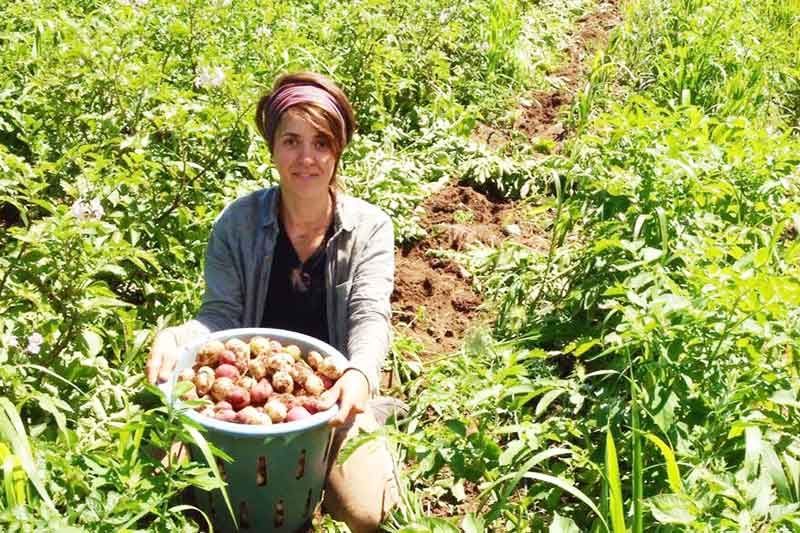Jonathan Davies | Jul 30, 2015
Early Sunday morning Ayla Fenton meets the van from Roots Down Organic Farm at the busy Memorial Centre Farmers Market in Kingston, where she will set up and vend produce into the afternoon. She is an energetic presence; you rarely see her standing idly, waiting.
Fenton is what one might call a new-generation farmer: little in the way of knowledge and social support has been handed down to her from a previous generation and so she, like many, is forging new trails.
Fenton is into her third year of interning. She began at Roots Down, was farm manager there in her second season, and still does Sunday sales for them. She currently spends the work week at Root Radical on Howe Island and is also active with NFU Youth as national vice president. In this role, she brings her ongoing education on the social and environmental effects of our food system, as well as the needs of younger farmers, to both the public and policymakers.
NFU Youth is currently working on an initiative called the National New Farmer Coalition, inspired by the National Young Farmers Coalition in the U.S. The latter organization, which began a mere five years ago, has networked thousands of farmers and gained some unexpected political wins, including essentially writing a section of most recent farm bill, adopted by congress, which saw millions of subsidies shifted from big agriculture interests to young start-ups.
Meanwhile, NFU Youth has conducted a survey of over 1,500 young farmers from across the country, the results of which will be compiled and analyzed, giving a picture of this generation's opportunities and challenges. What is already known and being communicated to politicians is that 70% of new farmers are not from farming backgrounds. Fenton notes that this means policy directions need to shift toward training and land access, and she senses that politicians are willing to listen.
What is harder to shift is export-driven policies, such as those promoted through deals like the Trans-Pacific Partnership. “Most policy is not about farming, but trade,” says Fenton. She has noticed that government is less willing to listen to diverse voices when it comes to international trade agreements, which is concerning, given the changing demographics and focuses of agriculture in Canada. “The NFU has shown that farmers are not advantaged by export-driven policy, contrary to what was expected,” says Fenton.
While this shift towards the smaller, locally-focused economic model that younger farmers favour is slow to take hold in countries like Canada, where industrial-scale, export-focused economics have long been tied to stability and growth, it has fast taken on momentum in other parts of the world.
Fenton had the opportunity to attend conferences held by Via Campesina, an organization that advocates for small-scale, sustainable agriculture in its many forms, first in Florida in 2014, where she learned about the conditions of migrant farm workers in the U.S. from the workers themselves, and again this past winter in Mali, where the focus was on defining agroecology.
Meeting people from Mali and across Africa, she became more aware of how the urgency of poverty and land degradation has prompted more hastened agricultural change there. “They have seen their land go from being half a desert to a full desert,” says Fenton, noting that in selling crops for export at low prices, farmers then have to buy food, generally not winning out in the equation.
Closer to home, Fenton helped organize a mixer held in Parham last fall for Young Agriarians, an organization focused on creating networking opportunities for young farmers. She will also be organizing a number of workshops in the region this fall for the Ecological Farmers Association of Ontario, as well as continuing to learn the trade through on-farm work.
More Stories
- No Winner Yet in Catch The Ace But Fundraising Target Met
- South Frontenac Food Bank Opens Second Location in Battersea
- Sharbot Lake Pentecostal Church Anniversary - 1925-2025
- Frontenac Holistic Health Fair - September 20 At Storrington Centre
- Odd Year For Real Estate - But Sales Are Steady Year Over Year
- 193rd Kingston Fall Fair
- Kim Phuc - the Napalm Girl - To Visit Flinton In November
- South Frontenac Council - September 2
- Sticker Shock - EV Charging Station To Cost North Frontenac Township
- 30th Anniversary Verona Car Show

